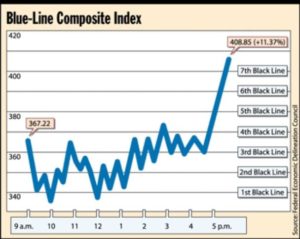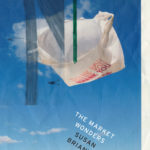I met Susan Briante at a poetry reading recently. It was her reading, from her book of poems The Market Wonders, in particular. I had a sense that I could learn quite a bit from talking with her.
A poetry book about The Dow, and market values, and human values? How could I resist reading and reviewing it?
In the first poem “Toward The Poetics of the Dow,” Briante notes that “I wish more poets would write about money.” I agree. It seems fair to respond also that more finance people should write about poetry.
My own comfort with commenting on poetry fades fast, when we move above the A.A. Milne level. Milne specifically differentiates himself in the introduction to his first book of poetry from Wordsworth, by declining to explain the background to his poetry and what he was thinking about and where he was as he wrote certain lines. Briante, on the other hand, does include helpful notes and references in the back of her book. This proves useful for people like me, who will otherwise miss the reference.
In the notes, she explains her project of recording the daily closing level of the Dow throughout 2009. From there, armed with a number (more or less arbitrary) she sought inspiration from disparate sources online and offline. Twenty-five of the poems in this book take their title from the format of “Date, Closing Level and direction of the Dow.”
The first three like that are, in order, “October 1-The Dow Closes Down 9509,” “October 6-The Dow Closes Up 9731,” and “October 14-The Dow Closes Up 10015”. You get the idea. There are twenty-five of these.
Briante writes:
“Poems should evidence some degree of control, but poets should be a little volatile. The poem is a high-risk investment, a long-term commitment. Like a big dirty city, it should make you feel
a little uncomfortable.”
Briante writes of Buddhist meditation. Drone attacks from above, police batons from the side. The heat of Texas and Arizona. Pregnancy, miscarriage, and then her daughter’s tiny form, breast-feeding. The Market as a shambling, nostalgic grandfather. Numbers in the titles, mini-poems along the bottom page like a running ticker.
The Market, as an old man, worries in one poem about falling down below the continental shelf from his excessive weight, and in another remembers a more carefree time when people made real things and he traveled the streets of Mexico City, and in a third he surveys the strip-mined earth from an airplane, just after contemplating the awful phrase ‘survived by,’ as if in an airplane crash.
Maybe my favorite appears like one of these little ticker-tape poems, although actually it’s a footnote to another poem. It is sly and horrifying.
*Can you
imaginesmell the Market picking uphisyour daughterfrom schoolin its teeth dragging parts of her body across aplaygroundlandscape touching everythingheit touches as if it were a screen? See how reflective the glass, how he is an it is a we.
One obvious thing to say is that the author and I probably disagree about where on the spectrum of good and evil the invisible hand of capitalism falls. I’m enough of an Adam Smithian to think the thoughtlessness of The Market, allocating both fairly and unfairly, regardless of the moral preference of many, is also a magical cornucopia of efficiency, innovation, waste reduction, and wealth creation. Briante, I gather, dwells more on the ambiguities inherent in the different meaning we assign to the word “Values.” She is more likely to point out the awful history of children’s insurance, the compromises we make with the military-industrial complex through banal bourgeois decisions about “security,” and remind us of hungry children at the border, as she does all three in the extended poem “Mother is Marxist.”
But even if we differ, I think we’re both interested in similar things. I’m an EX-banker for a reason, which is to say I appreciate The Market but do not want it to dominate my life, because it is a cruel master. It lacks, well, poetry.
Briante, I imagine, does not know about credit default swaps but wants to know more. She wants to meditate, and maybe guide other poetic types, to meditate on what it means to be immersed in a market economy, to hear – even unwillingly – about peripatetic fluctuations in the Dow and have a view on that. Is it all arcane numerology, as it may appear at first? Is there meaning? Or is it all – as I’m fairly convinced by this awesome Onion Article – mostly just noise?1
Please see related posts:
All Bankers Anonymous Book Reviews In One Place!
Not Cheering a Record-Setting Dow
Dow Hits New Highs Part I – Inevitability
Dow Hits New Highs Part II – The Future
Dow Hits New Highs Part III – What To Do Next
Post read (257) times.
- I always look for any chance I get to re-post this Onion Article, which is among my very most all-time favorites, and kind of sums up much of the news coverage from the Financial Infotainment Industrial Complex. You should click on it if you haven’t seen it before. ↩





